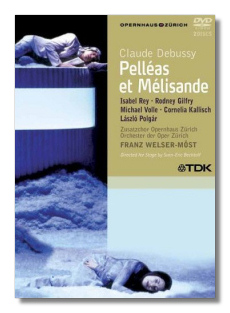
The Internet's Premier Classical Music Source
Related Links
- Debussy Reviews
- Latest Reviews
- More Reviews
-
By Composer
-
Collections
DVD & Blu-ray
Books
Concert Reviews
Articles/Interviews
Software
Audio
Search Amazon
Recommended Links
Site News
 DVD Review
DVD Review
Claude Debussy

Pelléas et Mélisande
- Isabel Rey (Mélisande)
- Rodney Gilfry (Pelléas)
- Michael Volle (Golaud)
- László Polgár (Arkel)
- Cornelia Kallisch (Geneviève)
- Eva Liebau (Le petit Yniold)
- Guido Götzen (Un médicin/Un berger)
Zusatzchor Opernhaus Zürich
Orchester der Oper Zürich/Franz Welser-Möst
TDK DVD DVWW-OPPEM 2DVDs 161min DTS DD 5.1 LPCM Stereo Anamorphic Widescreen
What do you do when a production sounds great but looks terrible? That's the question we're faced with while viewing this Pelléas from the Zürich Opera House in November 2004.
I'm a pretty tolerant guy when it comes to unconventional productions of an opera. A minimalist Madama Butterfly ? Così fan tutte set in Despina's seaside diner? As long as the production doesn't go against the grain of the work, I can meet it halfway. This time, however, we have a production of drab ugliness married to absurd staging: Pelléas as Ionesco or perhaps even Beckett. ("Waiting for Mélisande," anyone?) Allemonde appears to be in the middle of a nuclear winter: there is snow everywhere. At one point, Mélisande buries a mannequin of herself in it. "Wait," you exclaim, "did you say 'mannequin'?" I did. Each character has a life-size proxy of himself or herself that can fill in whenever things get too rough on stage – think of it as the mannequin is the body and the live singer is the soul, perhaps. This suspect idea gets completely out of hand in the scene in which Golaud has Yniold spy on Pelléas and Mélisande for him: Golaud, in his agitation, first rips off "Yniold's" left arm ("You're hurting me, Daddy," indeed!) and then his head. It is the mannequin's head – now with evilly glowing eyes – that Golaud holds up to spy into Mélisande's room. Really, it is a miracle that the audience was not howling in laughter… or in protest. The tower scene takes place in and around a snowbound automobile; Pelléas shuts Mélisande's hair in the car door, and when Golaud appears, it's from the backseat! And then there are those wheelchairs; they litter the stage as if Allemonde were a medical supply business that had suddenly gone bankrupt. I could go on, but you get the point. One guesses that statements were being made about infirmity (both spiritual and physical) and the characters' inability to communicate with and understand each other, but this production hits us over the head with "meaning" to the detriment of Maeterlinck's open-ended story. Stage director Sven-Eric Bechtoff and set designer Rolf Glittenberg receive the opposite of kudos from me.
On the other hand, the musical values are quite fine. Welser-Möst gets sensitive playing out of the orchestra, although sometimes the sound is a little too red-blooded, and he makes good decisions about tempos. Isabel Rey also sounds more mature and substantial than I find ideal in this role; no waif-like Mélisande for her! With that caveat, though, she is an excellent interpreter. Gilfry, a fine Don Giovanni, turns out to be an even better Pelléas. Even though French clearly isn't his first language, he communicates the text astutely. His voice is flexible and his timbre conveys the character's naïvete and sincerity. How unusual to find an American "baritone-martin." (He did study with Martial Singher, however.) Michael Volle is an imposing Golaud, although he does tend to lurch about – probably another one of Bechtoff's innovations. Polgár sings with warmth and no hint of illness. Bechtoff makes him seem like a dirty old man in his Act Four scene with Mélisande, though. Kalisch and Liebau are fine in their roles. Somehow, Liebau survives her blue (!) pageboy wig.
The fine sound is in the three expected formats, and the picture is Anamorphic Widescreen – all the better to see what we would rather not be seeing! The English subtitles have been managed well, although I spotted one or two solecisms. Compared to the production itself, that's not bad!
Copyright © 2006, Raymond Tuttle




















